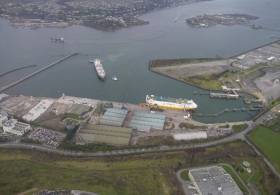Displaying items by tag: Increased Profits
The parent company of Irish Ferries, the Irish Continental Group, has today reported higher profits for 2023, but this was set back as its revenues dipped against background challenges of high inflation coupled with a slowdown in global trade.
According to the Dublin maritime transport group, its pre-tax profits for the year to the end of December had risen to €63.3 million from €62.5 million in 2022.
As for operating profits, they were driven from their ferry division, which saw a rise of 2.5% to €68.4 million from €66.7 million, which reflects a strong performance by Irish Ferries.
The ferry brand operates routes on the Irish Sea (Dublin-Holyhead/Rosslare-Pembroke), a direct service to France (Dublin-Cherbourg), and on the Strait of Dover, linking between the UK’s busiest ferryport and Calais.
Among the operator's fleet, is the chartered in Oscar Wilde which has since made its debut on routes to Wales and France, and has also returned to the Rosslare-Pembroke route from where it entered service last year. As in the above photo caption, Afloat.ie reports on the cruiseferry which is currently on relief duties for ropax Norbay while in dry dock.
Returning to ICG accounts, where revenues achieved for the year, however, eased by 2.2% to €572 million from €584.9 million.
For more RTE News reports on details of ICG’s financial accounts, which also include divisions involving container operations and related terminals based in Dublin and Belfast.
In addition the coverage refers to the Oscar Wilde, as alluded above and which in 2024 the cruiseferry will operate on the Dublin-Holyhead and Dublin-Cherbourg routes.
Boost to Port of Cork With Profits Up 79%
#ProfitsUp - The Port of Cork through increased activity saw profits increase by 79% to almost €4.5m last year, reports the Irish Examiner.
The State-owned company, which oversees port operations in Cork, saw revenue from charges to port users and property rental increase by 12.9% to €29.8m.
Ireland’s second busiest port also reported growth in the volume of goods passing through Cork in 2015 – up 8.6% to 11.02 million tonnes – although there was a slight decrease in the actual number of vessels – down 10 to 1,174.
In its annual report the company welcomed the decision by An Bord Pleanála, last May, to grant planning permission for a €100m redevelopment at Ringaskiddy which it described as a “critical infrastructure project”.
To read more click here
























































